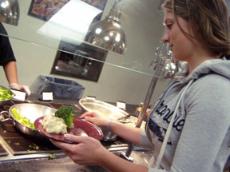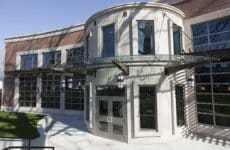By: Andrea Grasso
Posted In: News

Photo credit: Christina Borger
Another student juggles a glass of milk and a plate full of food.

Photo credit: Christina Borger
A student makes her way through the Miley dinner line without a tray.
NEWPORT – Salve Regina University is kicking off another academic year with a more environment-conscious staff. The housekeeping department as well as the dining staff is coming up with new ways to conserve energy, food, water, and the use of unnecessary toxic chemicals.
Miley cafeteria has eliminated the use of trays at meal times beginning this year. David Miller, director of dining services, explained some of the ways in which this tray-less dining helps the environment. One hundred twenty gallons of water were wasted each day from washing all the trays. However, water was not the only thing being wasted when the trays were in use. Students with trays tend to get more food than they are actually going to eat, said Miller. Eliminating the trays makes students and staff more aware of the choices they make each day in the cafeteria. Kevin Guidmond, manager of environmental services, described some new ways in which the housekeeping staff can use more environmentally friendly products. Microfiber rags and mops are now being used to reduce water consumption. The microfiber captures and holds more dirt particles, avoiding the constant process of dipping the mop or rag back into the water every so often. Salve’s housekeeping staff has also been introduced to the Quick Click Chemical Dispensing System. This catchy name applies to the new machine used for glass, general purpose, and neutral bathroom cleaners. The chemicals dispensed from this machine are green seal certified, which means that they are environmentally safe, said Guidmond. Typically, cleaners are mixed by hand and diluted in a bucket. However, with this machine, the chemicals are already mixed, measured, and ready to be used without any human contact. This machine avoids the wasting of water and solution and the risk of being in physical contact with any toxic chemicals. The staff members are also replacing their vacuums with ones that have two bags and more filters to prevent dust and particles from being released into the air. The toilet paper used on campus is green seal certified and is made and distributed with the intention of reducing the wasting of toilet paper and the amount of trees being cut to make the paper. Four and one half billion pounds of janitorial paper are consumed each year in commercial and institutional buildings. Fifty million trees are cut each year to produce these paper products. Salve Regina is not the only tray-less university. Nearly 20 other colleges and universities are adopting this new dining trend. The sustainability board will provide information which will be available on the SalveToday web site by mid-October.













